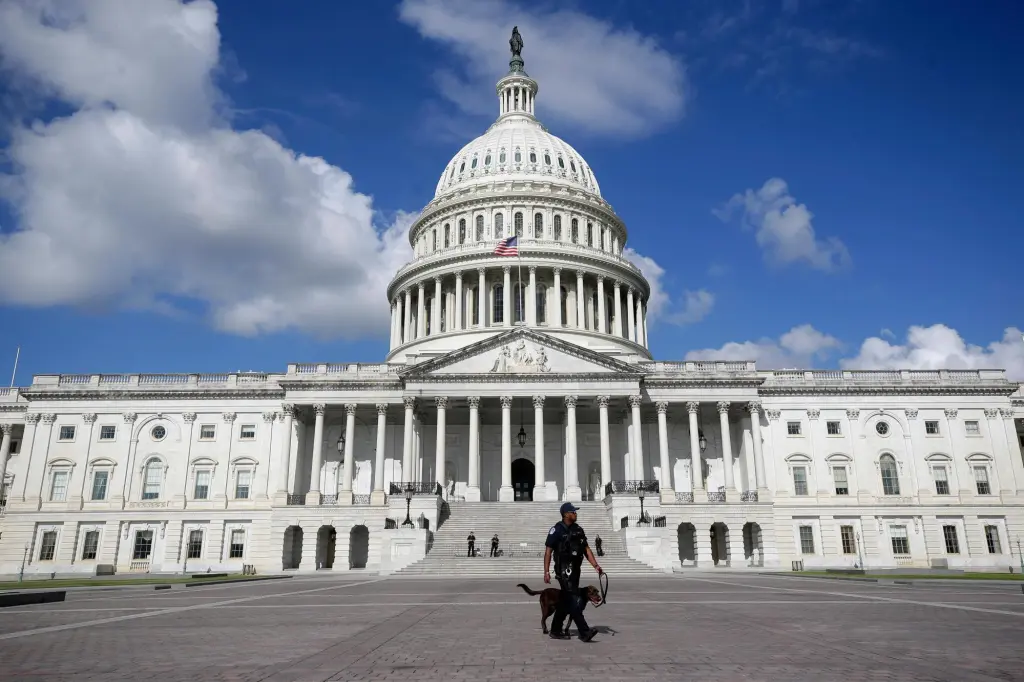
Congress is in a stalemate over federal funding after a series of failed votes on Friday to keep the government open and avoid a shutdown.
But Democrats, including Connecticut’s senators and representatives, aren’t backing off their insistence that any short-term funding bill must address health care priorities such as extending subsidies that would prevent sharp increases in insurance premiums.
The path forward is unclear, and the time crunch makes it more complicated. Congress is out of town all next week, and the House won’t return for votes until after the Sept. 30 deadline. The House originally had votes scheduled two days before the deadline, but GOP leadership cancelled them on Friday.
If neither side budges, that raises the prospect of a shutdown.
Lawmakers in both chambers took the first steps on Friday to pass a stopgap measure, known as a continuing resolution, to keep government agencies running at current levels for a specific amount of time. A short-term deal buys them more time to negotiate a full-year spending package for fiscal year 2026.
The House first passed a bill to keep the government running through Nov. 21. It passed mostly along party lines, but because Republicans narrowly control the House and only needed a simple majority, they didn’t need to rely on Democratic votes. Only two Republicans opposed it, and one Democrat backed the GOP proposal. All five Democratic members of Connecticut’s House delegation voted against it.
But the bill failed once it made it to the Senate, along with a competing measure from Democrats. The Democratic version extended funding through Oct. 31 and included similar provisions, such as more funds for lawmaker security. But Democrats added a host of health care measures that have been nonstarters for Republicans.
In the Senate, Republicans need votes from at least seven Democratic senators to reach the 60-vote threshold to advance a bill. All but one Democrat opposed the GOP continuing resolution, and both of Connecticut’s senators voted no.
Even with the short window, lawmakers have more time to strike a deal. But in the event they can’t figure it out in the next two weeks, Congress could be heading toward a shutdown —the first since a partial shutdown that started late December 2018 and lasted about a month into January 2019, during President Donald Trump’s first term.
In the event of a shutdown, essential functions and services would continue, including the intelligence community and other national security agencies. The most immediate consequences would be furloughs of federal employees who work for various government agencies. Some workers, however, would be exempt, such as the military and most air traffic controllers. But they wouldn’t get paid during a shutdown and would receive back pay once government operations resumed.
The longer a shutdown lasts, the more it could interrupt other key services. Connecticut’s senators warned of risks to veterans’ affairs facilities, as well as Head Start child care centers, that might not be deemed essential, as they were in the past.
But given an already-diminished federal workforce, a shutdown this year brings new risks, including the slowdown of important grants to some programs and services.
“It’s not just the checks going out — someone has to approve the checks, release the grant money,” U.S. Sen. Richard Blumenthal, D-Conn., said in an interview. “We’re in uncharted territory with so many of these agencies already hollowed out, so a shutdown could be a tipping point.”
Both parties are already pointing fingers. Republicans say they offered Democrats a “clean” extension of government funding for the next seven weeks. They called Democrats’ plan an “unserious” proposal with a hefty price tag.
“The kind of clean CR Republicans have put forward used to be something Democrats embraced. In fact, Democrats voted in favor of clean CRs no fewer than 13 times during the Biden administration,” Senate Majority Leader John Thune, R-S.D., said. He called Democrats’ alternative a “fundamentally unserious proposal designed to appease Democrats’ liberal base.”
Democrats counter that the GOP won’t engage with them in bipartisan negotiations to keep the government running.
They are trying to exert the rare leverage they have in funding talks, with their main priority focused on extending Affordable Care Act premium subsidies, undoing health care provisions in the “big beautiful bill” including Medicaid cuts, and reining in the Trump administration from clawing back funding that Congress already approved.
Their version of a continuing resolution was crafted in part by U.S. Rep. Rosa DeLauro, D-3, who serves as the ranking member of the House Appropriations Committee.
U.S. Sen. Chris Murphy, D-Conn., argued that having some guardrails in place for how the White House freezes or pulls back approved federal funding is especially important for Connecticut. He pointed to the administration’s decision to halt the state’s offshore wind project, Revolution Wind, which is 80% completed.
“We just want the president to obey the law. We don’t want insurance rates for people to go up, and unfortunately, Republicans are unwilling to stand up for families all across this country here and see insurance premiums go up and to stand up for the Constitution and rule of law,” Murphy told reporters on a call with Blumenthal after the Senate voted on the dueling government funding bills.
Republicans have resisted including the expiring subsidies in the bill and believe they can be addressed later in separate legislation. Democrats argue there’s an urgency to get it done now, particularly with open enrollment in the state-based exchanges beginning on Nov. 1.
“For everybody who is thinking, ‘Well, can’t they wait?’ No, we cannot wait to do these measures,” Blumenthal said on the call with reporters. “It is imperative that we act now. There is an urgency to people who are going to be sick, who need surgeries, who are undergoing treatment, and their health care insurance will be unaffordable to them because the premium tax credits will end or they will be off Medicaid.”
If the subsidies expire at the end of the year, states would have to pick up the costs. For Connecticut, officials could spend more than $295 million a year, according to a spokesperson with Access Health CT.
That prompted Gov. Ned Lamont and governors from 17 other states to call on congressional leaders to extend federal subsidies that help more people afford health coverage through state-based marketplaces.
Nationally, if the subsidies expire at the end of the year, the Congressional Budget Office projects that more than 4 million people would lose health care coverage over the next decade, citing increases in out-of-pocket expenses because of more costly premiums. Connecticut residents who get insurance through the state health care exchange could pay an average of $1,700 more a year.
The expiration of enhanced tax credits will lead to out-of-pocket premiums for ACA marketplace enrollees increasing by an average of more than 75%. Insurers expect healthier enrollees would drop their coverage and cause premiums to then go up, according to a Peterson-KFF analysis.
If the government shuts down on Oct. 1, it’s unclear how long it would last and what negotiations between the parties would look like.
“I don’t know. It’s obviously very worrying that [Republicans] are not negotiating now,” Murphy said. “And I worry that Donald Trump has just decided that he’s not going to talk to Democrats. He’s going to use the White House to try to politically punish Democrats.”
Blumenthal echoed the sentiment that any talks could be at the whims of the president. “He could decide the day after the shutdown that he wants to negotiate and do what’s right for the country.”
Lisa Hagen is is CT Mirror and CT Public’s shared Federal Policy Reporter. CT Mirror reporters Jenna Carlesso and Katy Golvala contributed to this story.



